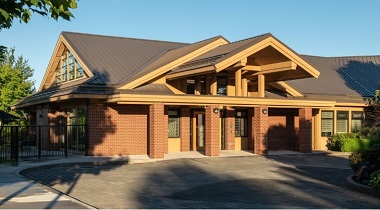
The Delta Hospice Society operates the Irene Thomas Hospice.
A Ladner hospice has offered to forgo $750,000 in provincial funding so that it will not be obliged to assist in ending the lives of any of their residents.
The Delta Hospice Society is on the front lines of a battle between those who want increased access to medical assistance in dying (MAID) – the politically correct way of describing assisted suicide – and those who oppose it.
A January 27 post on Convivium lays out the dilemma, and the threat of potential closure, facing the hospice:
Over the past three decades, a small palliative care hospice in suburban Vancouver has raised millions of dollars and provided hundreds of thousands of volunteer hours to benefit British Columbia’s health system.
Now, the Delta Hospice Society must drop its refusal to provide Medical Aid in Dying (MAiD) for qualifying patients in its care. Or else.
In a bid to stave off whatever “or else” might mean, the Hospice Society board contacted its overseer, the Fraser Health Authority, offering to give back $750,000 in public money it receives. Returning the funds would place it beneath a particular threshold so it can operate without being obliged to medically kill the sick and dying.
Unfortunately, notes board president Angelina Ireland, we live in a time when MAiD means more than money.
“When I spoke to the CEO of Fraser Health and one of the VPs there, they told me ‘no, we don’t care.’ They just wanted to get me off the phone. They weren’t even interested in talking to us,” Ireland told Convivium. “They’re coming in with a hammer, and it’s boom – or else.” . . .
She admits the 10-bed hospice might be mere weeks from being crushed unless it agrees to comply and permit MAiD on its premises. While the Society owns the building and has a 35-year lease on the land, the Fraser Health Authority decides which patients are admitted for palliative hospice care.
Go here for the full article.
The situation is making news beyond our borders. A recent article in the influential conservative American magazine National Review – Pressuring a Hospice to Kill – described the plight of the Delta Hospice Society:
Should hospice professionals be forced to assist the suicides of their patients who want to die? Not too long ago, the answer to that question would have been an emphatic “Of course not!”
Hospice is not about making people dead. Rather, it seeks to help terminally ill patients live well through intensive medical, spiritual, psychological and social treatments to alleviate the pain and emotional suffering that dying people and their families may experience.
Don’t tell that to the provincial government of British Columbia. After the Supreme Court of Canada conjured a right for anyone diagnosed with a serious medical condition that causes “irremediable suffering” to receive lethal-injection euthanasia, British Columbia passed a law requiring all medical facilities that receive at least 50 percent of their funding from the government to participate in what north of the 46th parallel is known euphemistically as “medical assistance in dying” (MAiD).
When Delta Hospice Society, in Delta, British Columbia, announced that it would adhere to the hospice movement’s founding philosophy by banning euthanasia in its facility, the province’s minister of health threatened to cut off all provincial funding. Delta has until February 3 to yield to the euthanasia imperative or face a catastrophic financial crisis.
Thus far the hospice has resisted pressure to participate in euthanasia.
Support for hospice
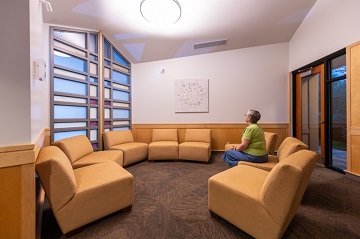
The interior of the Irene Thomas Hospice.
The hospice has support, as a recent article in The B.C. Catholic pointed out:
The Canadian Hospice Palliative Care Association and the Canadian Society of Palliative Care Physicians released a joint statement in late 2019 saying a hospice is not an appropriate place to end the lives of patients.
“MAID is not part of hospice palliative care; it is not an ‘extension’ of palliative care, nor is it one of the tools in the ‘palliative care basket,’” they wrote.
“Hospice palliative care focuses on improving the quality of life and symptom management . . . for those living with life-threatening conditions . . . Hospice palliative care does not seek to hasten death or intentionally end life. In MAID, however, the intention is to address suffering by ending life.” . . .
The Delta Hospice Society also has support from the Euthanasia Prevention Coalition, whose petition in support of the hospice [now has 18,000 signatures], as well as the Catholic Physicians’ Guild, which represents about 50 local health care workers.
Go here for the full article.
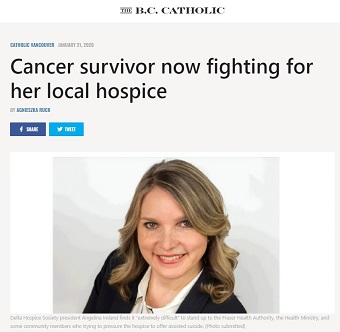 A follow-up article with Delta Hospice Society president Angelina Ireland included this:
A follow-up article with Delta Hospice Society president Angelina Ireland included this:
“It’s been extremely difficult on many fronts,” she said. “First of all, you’re standing up to the big government. We’re just a little 10-bed hospice but we’re standing on what we believe to be correct, what we believe to be true . . . We believe we are following on what palliative hospice care truly is.”
Go here for the full article.
Don’t extend MAID
The skirmish in Ladner is just one front in a larger battle over the legitimacy and extent of medical assistance in dying across Canada. A couple of weeks ago I posted an article by the Evangelical Fellowship of Canada (EFC), which began:
The government is asking Canadians their views on safeguards for medical assistance in dying (MAID). Whether Canadians support safeguards or not will have an impact on what the government includes in new legislation on MAID, which is expected very soon.
 The federal government has opened a two-week online consultation on expanding eligibility for medical assistance in dying (MAID). The consultation will close on January 27. Federal cabinet ministers are also holding in-person discussions with experts across the country.
The federal government has opened a two-week online consultation on expanding eligibility for medical assistance in dying (MAID). The consultation will close on January 27. Federal cabinet ministers are also holding in-person discussions with experts across the country.
The Prime Minister has instructed the Justice Minister to respond to a recent Quebec court ruling on the MAID framework, which struck down the requirement that a patient’s death be reasonably foreseeable in order to be eligible for MAID.
The government decided not to appeal this decision to a higher court. Its decision to apply the Quebec ruling across the country is prompting the government to ask for feedback on other changes to the legislation.
The court gave the government six months to rewrite the legislation, until March 11, 2020. When the decision takes effect, it will change the way the federal MAID law is interpreted and applied in Quebec.
It seems likely that the government will introduce a bill to expand access to MAID and to remove certain safeguards.
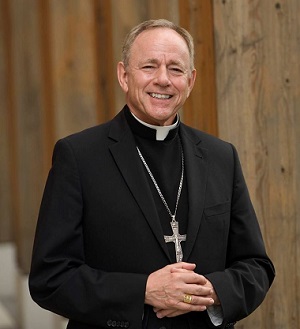
Archbishop Michael Miller
Many other Christian groups urged similar action. Vancouver Roman Catholic Archbishop Michael Miller issued a statement asking Catholics to share their views in the euthanasia survey, as did the Canadian Conference of Catholic Bishops.
And The B.C. Catholic reported January 24 that “BC and Yukon bishops are joining with the bishops of Alberta and Northwest Territories in calling on Canadians, and Catholics in particular, to oppose any expansion of assisted suicide.” Go here for the Pastoral Letter.
Although the Catholic Church is the largest member of the Canadian Council of Churches (CCC), that body has not taken a stand against increased access to euthanasia. The best they have been able to do is to link back to their October 2016 Statement of Support for Universal Access to Palliative Care, which “was prompted at first by the issue of legalizing physician-assisted death in Canada.”
The CCC adds, “work is continuing, and revealing a wide spectrum of theological and pastoral approaches and views.”
Public pressure
This equivocation on the part of the Canadian Council of Churches may reflect the fact that MAID has very broad support beyond the Christian community (and quite likely within it, despite clear opposition by the Evangelical Fellowship of Canada and Canada’s Catholic bishops).
The B.C. Catholic interview with Angelina Ireland of the Ladner hospice included this:
The community has become deeply divided over the issue. Ireland said the hospice society has wholehearted supporters as well as strident opponents. She and other staff members have received personal threats on social media.
“It’s been difficult to be called a monster and to be called a horrible person. All we’re trying to do is truly protect the vulnerable,” she said. “It’s not an easy stance to make but we feel that it’s necessary because we are committed to hospice and palliative care.”
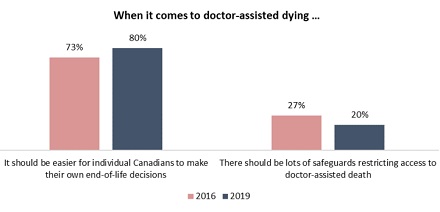 A survey on Social Values in Canada released by the Angus Reid Institute January 24 suggests that the hospice and pro-life Christians face an uphill battle in preventing any expansion of assisted suicide:
A survey on Social Values in Canada released by the Angus Reid Institute January 24 suggests that the hospice and pro-life Christians face an uphill battle in preventing any expansion of assisted suicide:
Another ongoing discussion over recent years in Canada has been the right to doctor-assisted dying. The Superior Court of Quebec ruled this past September that a requirement in the current federal law, which limits access to assisted dying to terminally ill patients, was unconstitutional. The Trudeau government has accepted the court ruling and began public consultations regarding how best to amend the federal law.
Canadians overall appear in favour of these recent developments, Four-in-five Canadians (80%) say that it should be easier for individual Canadians to make their own end-of-life decisions when it comes to doctor-assisted dying. This represents an increase from 73 per cent in 2016. One-in-five (20%) prefer more safeguards to restrict access to this type of procedure.
Go here for the full study, which considers Canadians’ views on several issues, including abortion, (where opinion is much more evenly divided than on assisted dying), LGBTQ2 rights and diversity.
